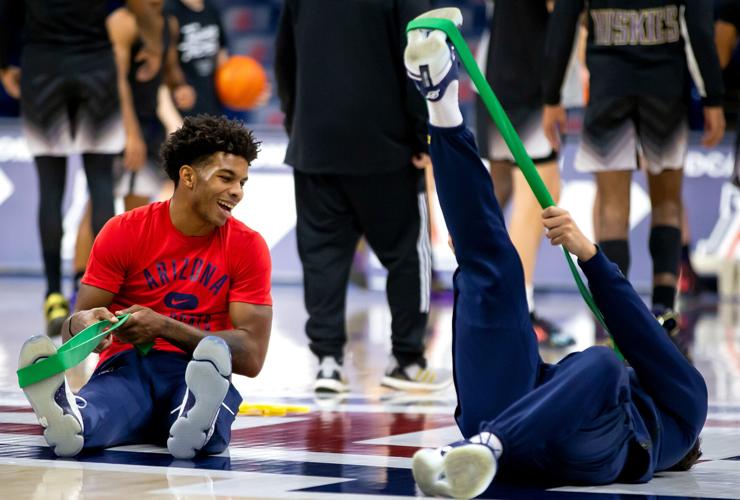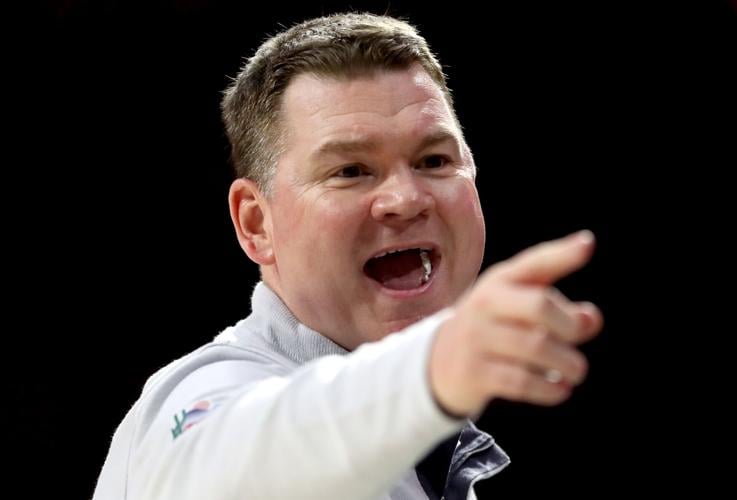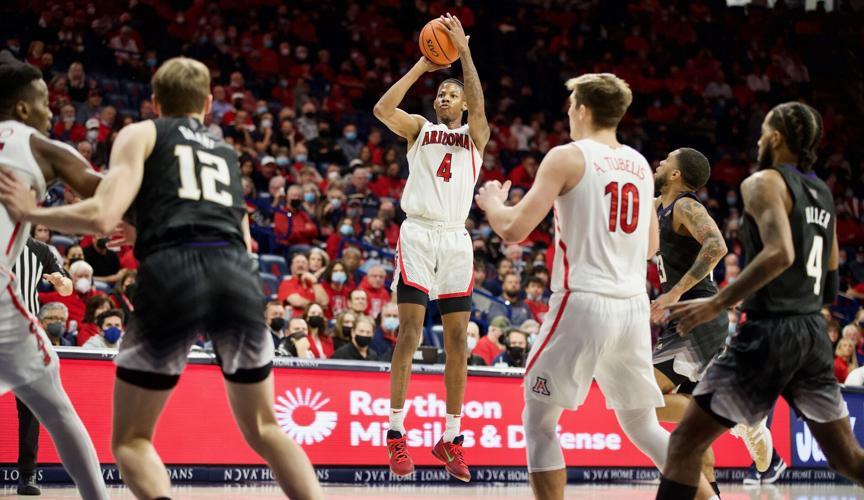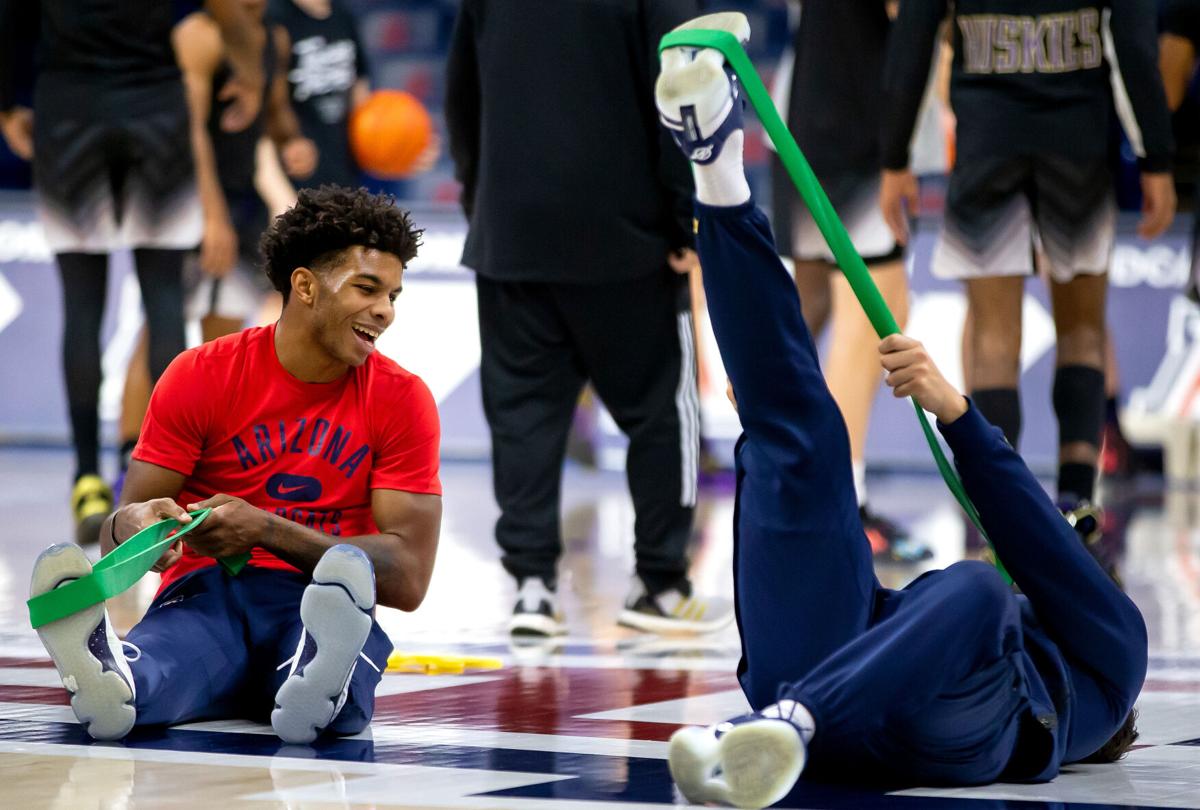With another four of 10 games postponed this weekend, the Pac-12 has barely been able to launch its men’s basketball race except in one aspect.
So far, Arizona is the league leader in COVID-19 avoidance. The Wildcats had eight games postponed or canceled last season because of their opponents’ issues, and another four so far this season, but they’ve never had a pause of their own.
They’re 12-0, in that sense.
All other Pac-12 teams have had pandemic-related pauses of some sort since the start of the 2020-21 season, and all but Arizona, Utah and Cal have paused so far this season.
But that isn’t the sort of thing the Wildcats are celebrating much. For one thing, their opponents’ issues have created an uncomfortably idle start to their New Year, with Arizona nearing the end of a period in which it will have played only one game over a 22-day period thanks to issues that postponed games with UCLA, USC and ASU.
For another, well, it’s COVID-19. Anything can change, at any time, for anyone.
That race is hardly over.
“I go to bed thinking about this every single day now for two years,” Arizona athletic trainer Justin Kokoskie said. “I wake up thinking about this. I can’t let my foot off the gas pedal at this point.”
As the center point between Arizona’s medical team and it’s men’s basketball players, Kokoskie works directly with the players on COVID-19 protocols. He and TJ Benson, UA’s special assistant to the head coach, also incorporate protocols into road trips, such as arranging room service, outside/private dining or spaced-out buses.
“When we landed (in Tennessee last month), my first question to the hotel was ‘Hey what are your protocols? Do you guys do a good job of masking if they need to? Is there anything else abnormal?’” Kokoskie said.
Kokoskie said his biggest worry so far has been false positives, with a few of them keeping staffers initially off the sidelines of a game at Utah last season until follow-up testing cleared them. But he also acknowledged things could change at any time.
Bad luck. Randomness. The reported transmissibility of the omicron variant.
All those are factors that could change things quickly for the Wildcats, but Kokoskie said he’s confident at least in the measures UA has taken over the past season and a half.
Here are five reasons behind UA’s success avoiding COVID-19 so far:
1. They’re getting jabbed.
Unlike some other teams and individuals throughout the sports world, the Wildcats have consistently been receiving COVID-19 vaccinations. UA coach Tommy Lloyd said his team was fully vaccinated before the season, and Kokoskie says all 12 of the Wildcats’ scholarship players have been boosted.
“Our team is asymptomatic, fully vaccinated and fully boosted at this point,” Kokoskie said Friday.
Vaccinated players at Arizona do not have to submit to “surveillance” testing — routine testing of asymptomatic players, which was required on a near-daily basis last season — but Kokoskie said the Wildcats have also been good about reporting symptoms to him and taking precautionary tests if needed.
“We’ve had staff and we’ve had players (test) because you have to also think you’re in the middle of cold and flu season as well,” Kokoskie said. “This isn’t the only virus going around right now.”
2. They’re staying flexible.
When Wildcats played at Tennessee just before Christmas, the team was already re-implementing some COVID-19 protocols from last season.
“At this point we would not we would encourage everybody not to get together in the middle of a restaurant in an indoor area and dine,” Kokoskie said. “Just to be safe.”

Justin Kokoskie
As COVID-19 began sidelining teams all over the Pac-12, some firmer protocols were added. Instead of holding team meals, the Wildcats have been set up with accounts at local restaurants where they can grab a meal and take it home to eat.
“We’re not asking them to completely stop living their lives,” Kokoskie said. “But we are asking them to make decisions that are proven to help limit their exposure and help our community as well.”
The team even shifted in-person media interviews to Zoom, and McKale Center ushers now hold signs reminding fans to wear masks.
Of course, things may change again.
“With today’s COVID environment, we have a lot more questions than answers,” Kokoskie said. “I think another really complicated thing is you have a lot of medical professionals out there that that to that want to speculate and say, ‘This is how to do it.’ But I think the realization of this is sometimes it’s OK saying, ‘We are not sure. We’re not positive right now on some things.’
“But what I do know is if we do our part and we think big picture, we protect the community, we keep an eye on our local county, our local officials, our numbers, on the hospitals being overwhelmed, I know we can look ourselves in the mirror and say we’re doing everything we can to give the student athletes the best experience and put them in the safest environment.
“They ultimately want to keep playing sports and play basketball. So we’re kind of continuing to march on. But we also are realists and understand that it could change at any time depending on the situation. We’re trying to not let our guard down but that totally can’t prevent an outbreak.”
3. They travel carefully.
While chartered flights automatically reduced some of the Wildcats’ potential COVID-19 exposure by keeping them out of terminals and away from passengers not in their travel party, the program added several other measures last season to further decrease their risk.
The Wildcats booked separate rooms for each player, took two buses instead of one to allow proper distancing and generally had all meals either delivered or brought back to their rooms.
However, all that adds cost. This season, Kokoskie said the team is trying to balance finances with being careful, suggesting that while players may not have their own rooms, key players probably won’t room together so as to minimize the chances that the Wildcats’ playing rotation could be decimated by contact tracing.
“We will be very strategic on how we do things moving forward,” Kokoskie said. “Whether it’s buses, whether it’s roommates, we’re definitely going to keep an eye on all those things.”

Arizona coach Tommy Lloyd has been "phenomenal" when it comes to working with the training staff, Justin Kokoskie says. “It’s, 'Hey, let’s go with the flow. Here’s what we’re expecting and if all of a sudden we have to play three or four games in a week, we haven’t crushed the guys in practice.’"
4. The coaches cooperate.
Kokoskie has worked for the UA since 2002; he said he would have “been a little bit more on edge” if he had to implement protocols or discuss his concerns with coaches as an inexperienced young trainer.
But Kokoskie said his process has also been made much easier because of how former coach Sean Miller and Lloyd have worked with him. Neither complained when Kokoskie pulled a player out of practice for what sometimes turned out to be only allergies.
“Last year, many times I had to go to Sean in the morning and say, ‘Coach, I’m not sure about this.’ And he’d say, ‘I trust you. Tell me what to do.’ And the same holds true with Tommy this year,” Kokoskie said. “I’m very fortunate that I have had the chance to work with those two. Because as you can imagine, if you had a challenging coach and staff, this could be a disaster, if they’re questioning every decision that you’re making.”
Kokoskie said both Miller and Lloyd also tailored practices around how COVID-19 may be affecting their schedule.
Right now, that’s a particular concern. The Wildcats are expected to play multiple three-game weeks if their postponed games are all made up, something that could test them physically — and increase Kokoskie’s work and stress level.
“Sean couldn’t have been greater with that last year, and Tommy has been phenomenal,” Kokoskie said. “It’s, ‘Hey, let’s go with the flow. Here’s what we’re expecting and if all of a sudden we have to play three or four games in a week, we haven’t crushed the guys in practice.’
“We always say, ‘Hope for the best, prepare for the worst,’ and there’s no greater time to say that than right now. I think if we had to play four games next week, we’re ready for it. If we had to play five — I trust our guys — we would be ready for it.”

Dalen Terry and the Wildcats are scheduled to return to action on Thursday against Colorado.
5. They trust each other.
That’s the bottom line, Kokoskie said. Not just with the coaches but also with the players.
Because the Wildcats don’t have to surveillance test, a lightly symptomatic player could hide symptoms in order to make sure he could keep playing.
Yet Kokoskie said players and staffers have routinely submitted for testing so far this season.
“It’s happened numerous times,” Kokoskie said. “Ultimately this a lot of this comes down to trust. Your team has to trust you, your medical professionals and your athletic trainer. And your medical professionals have to touch trust your team and coaches.
“I also have a relationship with our players so that with the first sign of anything they let me know. Our guys, I can tell you they’re doing a great job and I’m proud of them for the trust factor. Their overall communication couldn’t have been better in the last two years. We have an exceptional group of kids and we have an exceptional group of coaches.
“Teams that stick together and totally trust each other are the ones that are going to have every advantage moving forward.”








